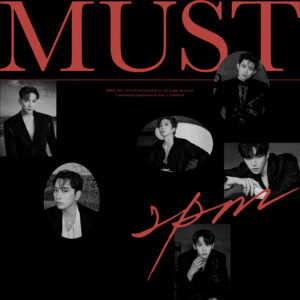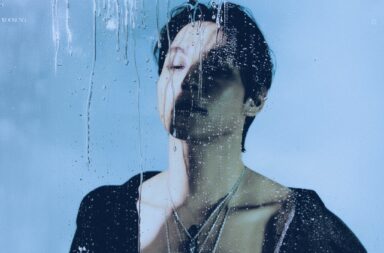
Six military enlistments, several combined acting credits, and one five-year hiatus later, 2PM are finally back with their long-awaited seventh album, Must.
After an initial comeback announcement in January, followed by months of uncertainty as to whether or not said comeback would still be happening this year, JYP finally reconfirmed the group’s highly anticipated return in April.
Must comes nearly five years off the heels of the sextet’s last full-length album, GENTLEMEN’S GAME, which featured the single “Promise (I’ll be).” It also follows the resurgence in popularity of their 2015 song “My House,” and it certainly shows — the album is very much inspired by the song’s laid back vibes (and lyrics), and even includes an acoustic version of the hit as its final track.
Prior to Must’s release, there was no telling which direction the group would take next. After all, prior to June 28, 2021, they hadn’t released new music since 2016. Known for first introducing and popularizing the image and idea of the “Beast Idol,” 2PM were and are primarily known for their electronic-based sound, featuring pulsating beats fit for a night out at a club. But Must takes a totally different approach, taking much of its inspiration from jazz, pop, and even R&B.

A genre like jazz certainly isn’t the first thing long-time fans of the group (called “Hottest”) would first associate 2PM with, but each of the six members proves they have the versatility and maturity to explore this previously untouched territory. They’re still their usual beastlike selves, only in a more sultry and subdued way. Between an exceptionally strong vocal showcase from each of the members, a cohesive musical and lyrical throughline between all ten tracks, and plenty of catchy melodies, 2PM proves that they’re back and better than ever on Must.
One of the album’s stronger points is its cohesiveness in terms of sound, instrumentals, and overall vibe. “Intro,” the first track on Must, vividly sets the tone and atmosphere for the remaining nine songs — so much so that it’s nearly impossible to misread. It features repeated, seductive trumpet and guitar riffs set against a jazzy rhythm, all of which serve as common instrumental callbacks throughout the rest of the album. All of these elements combine to paint an unexpected, albeit vivid portrait of an album set against the backdrop of something like a nighttime jazz bar (as also made clear in the album’s highlight medley video). It’s fresh and new for the group, but in the following songs, they prove that it works.

Although “Intro” is clearly in the vein of a La La Land-esque jazz bar, “Make It,” the album’s title track and second song, takes a quick step back into 2PM’s “My House” era.
For better or worse, “Make It,” written by member Wooyoung, is very much a continuation of both the success and actual sound of “My House,” as its beginning guitar riff sounds almost like an interpolation of that of the 2015 hit. The undeniable similarities between the two feels a little gimmicky at first, but any triteness quickly fades away once “Make It” settles into its chorus.
“Make It”’s chorus is backed by a funky, jazz-pop groove, which again feels completely different from anything the group has previously done. However, in typical 2PM fashion, the chorus’s lyrics are catchy as ever. Throughout the track, Nickhun and Junho alternate between owning the chorus, singing the rhyming lines “해야 해야 해야만 해” (haeya haeya haeyaman hae) and “돼야 돼야 되어야만 해” (dwaeya dwaeya dweeoyaman hae), which both translate to “I gotta gotta gotta.” The song’s lyrics aren’t necessarily anything to fawn over, but they undoubtedly do the job of drawing listeners in with their catchines.
Another notable point of “Make It” and the entirety of Must is the members’ vocals. “Make It” sets the standard for the strong and smooth vocals showcased on the rest of the album. On this track, as with the other eight vocal-based songs on the album, each member’s unique tone and voice is distinct and shines in the foreground, never getting buried underneath the layers of rhythms and instrumentals of the song. The jazzy breakdown at the beginning of the last chorus highlights this vocal strength and brings the catchiness of the chorus home, at the same time connecting the song directly back to the blazing horns first featured in “Intro.”
Must continues to ride this wave of powerful yet smooth vocals into “OK or Not,” the third track on the album. Written by Jun K, “OK or Not” upon first listen feels somewhat out of place, although perhaps purposely so. Rhythm-wise, it’s repetitive, simple, and almost uplifting. But lyrically, it’s about being hurt at the hands of a love interest, and teeters back and forth (literally) between claiming to be okay and not okay. In the first half of the chorus, Jun K sings:
“It’s okay, really okay
Okay not okay
Saying that you would leave me, that would be better
So it’s really okay
You are okay you are okay
Not okay not okay
It should have been fine
Actually I’m not okay”
His vocals, along with those of the other five members, are emotive as ever, helping to make what at first feels like a questionable track compelling and catchy. On top of that, the track’s background layers, which sound like backing vocals edited to emulate bright synths, add to the song’s intrigue and distinctiveness to ensure that it doesn’t get lost amongst Must’s other standouts.

In a somewhat surprising twist, the emotional “OK or Not” is directly followed by “On My Way” and “Champagne,” two upbeat, faster paced songs that are reminiscent of an earlier 2PM. “On My Way,” another track written by Jun K, makes the lyrical theme of the album clear up to this point — it’s about missing someone or wanting to be with someone, whether it be a toxic ex (“OK or Not”), someone only seen in passing (“Make It”), or another, less toxic ex (“On My Way”). It’s one of the more catchy songs on the album, thanks to the chorus’s complex, club beat and repetitive, conversational lyrics.
With both “On My Way” and “Champagne,” an EDM track written by member Taecyon, Must takes a turn into more playful territory. In addition to “On My Way”’s heavy, Latin-influenced beat and subtle EDM sounds, its lyrics a lean into clever wordplay to get the song’s meaning across. During the chorus, Jun K and Junho, who alternate between owning this part of the song, sing:
“I don’t need it all, I want to see you
I’ll go see you (I’ll go see you)
I want to see you without needing to say much
I’m going to see you, now you”
After they sing of not “needing to say much,” the phrases in the lyrics literally get shorter, ending with just “now you.” The words within the lyrics bounce and play off of one another throughout the song, making for a conversational framework that adds to the song’s easiness and catchiness. “Champagne” features similarly fun lyrical wordplay, but instead utilizes the metaphor of champagne itself as a comparison to the object of their affection. Jun K’s rapping of “Doesn’t matter where we are it’s a party” and “Once you pop you just can’t stop” is also a pleasant surprise.

“The Cafe,” the sixth track off of Must, sits in complete contrast to “On My Way” and is perhaps even the antithesis of “Champagne,” as the members ask their love interest if they want to go to “the cafe” for some coffee. It also poses the question: is this whole album a sequential story? Perhaps “On My Way” is 2PM on their way to the club for some “Champagne,” and “The Cafe” is what transpires the morning after (at the cafe).
Aptly named, “The Cafe” paints a literal portrait of a cafe through its lyrics and is the type of track to be played inside an actual coffee shop. It balances an upbeat, light piano melody with the members’ sultry, sensual singing. Chansung‘s vocals in the bridge are a particular standout point on the track, showcasing his unique tone and smooth vocals.
That smoothness carries right into “Moon & Back,” the album’s more R&B-influenced track. As in “OK or Not,” the members’ vocals on “Moon & Back” are front and center, and backed by a repetitive rhythm and a light layer of synth instrumentals. Thanks to the song’s lyrical simplicity, there’s plenty more opportunity for ad libbing, which each member takes advantage of. In the chorus, Jun K shows off his honey-like vocals, seamlessly fluctuating between higher and lower notes. Nickhun’s and Chansung’s verses especially stand out, with Chansung in the second verse singing: “Love, it was funny to me / Believing that nothing lasts forever.”
As in “On My Way,” the lyrics in “Moon & Back” are again pleasantly sung in a more conversational tone, making it easy for listeners to follow along and absorb themselves in the song. Throughout the choruses, the members also repeat the lyric “Love you to the moon and back, yeah,” putting their own spin on the line with their distinct voices to show their unique vocal prowess. “Moon & Back” is the sultry bread and butter of Must, and hints at what’s to come for its final few tracks.

The last two new songs on the album, “Two of Us” and “Hold You,” succinctly finish what “Moon & Back” started by leaning into its sensual, soft, and smooth tone and vibe. The sweet piano melody at the beginning of “Two of Us” is surprisingly reminiscent of a Colde song, but the group manages to make it their own with their individual styles of singing.
The chorus of “Two of Us” is casual, both in terms of lyrics and sound, emulating something like a late night walk through the city. As a heavy acoustic drum beat leads into a slow progression of jazzy horns, the chorus’s meaningful lyrics are sung by various members in a casual tone: “You’re the only one / It’s nice to be together, two of us.”

“Hold You,” the last new song on Must, continues with a piano melody similar to that of “Two of Us,” only softer and more subdued. The members’ vocals go one step beyond the precedent set in the previous song, and become even softer and more conversational than before. Nickhun sings:
“I have all my spare time
Someone called you,
Someone who will be by my side because I met you”
“Hold You” has that vintage ballad feel that sends home the late night musings encapsulated in Must. In the post-chorus, the members are the vocal beasts they’ve always been, with Jun K giving it all on his riffs, and each of the members alternating between singing “I won’t let you go” all together and separately.
If the yearnings of “Hold You” wasn’t enough, Must ends with a nod to the song that bubbled 2PM back to the surface — an acoustic version of “My House.” It’s a nice treat for fans new and old, and fits evenly into the album’s lyrical and musical themes. It’s hard to separate a song as iconic as “My House” from its origins, but 2PM cleverly finds a “house” for it on this new album.

For a group that’s been out of the K-pop scene for an unexpectedly long amount of time, Must is a much-needed, “must” of a comeback for 2PM. Although it’s one of the group’s first forays into genres like jazz, pop, R&B, and generally slower jams, they still manage to remain starkly and recognizably themselves. From heavenly, honey-like vocals from each of the members to compelling instrumental layers and lyrical stylings, 2PM proves that Must is just as its title suggests.
(YouTube: [1][2][3]. Naver. Lyrics via Genius and Lyrics Tubes. Images via JYP.)


